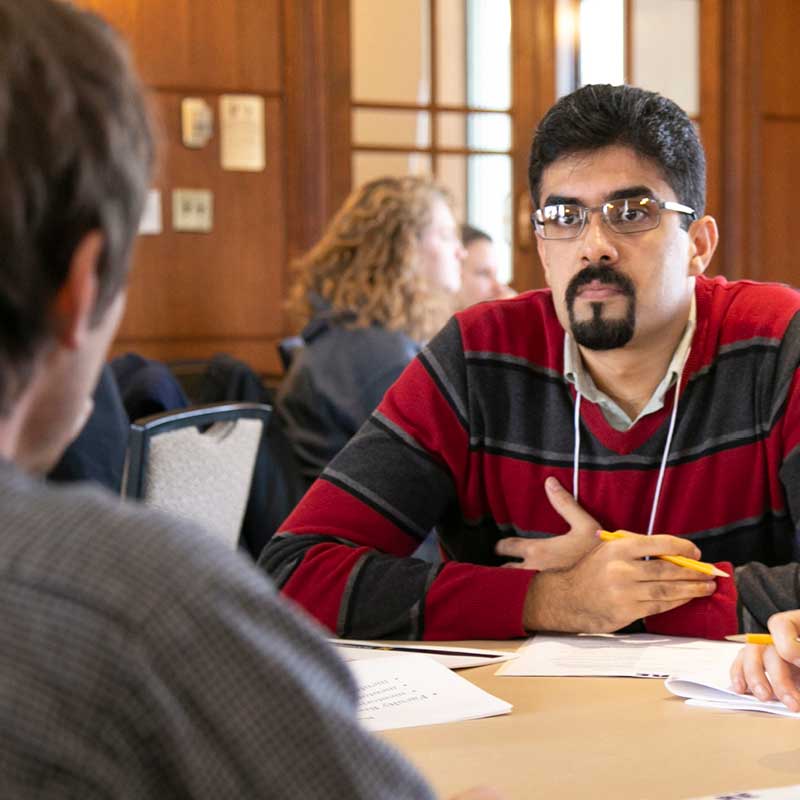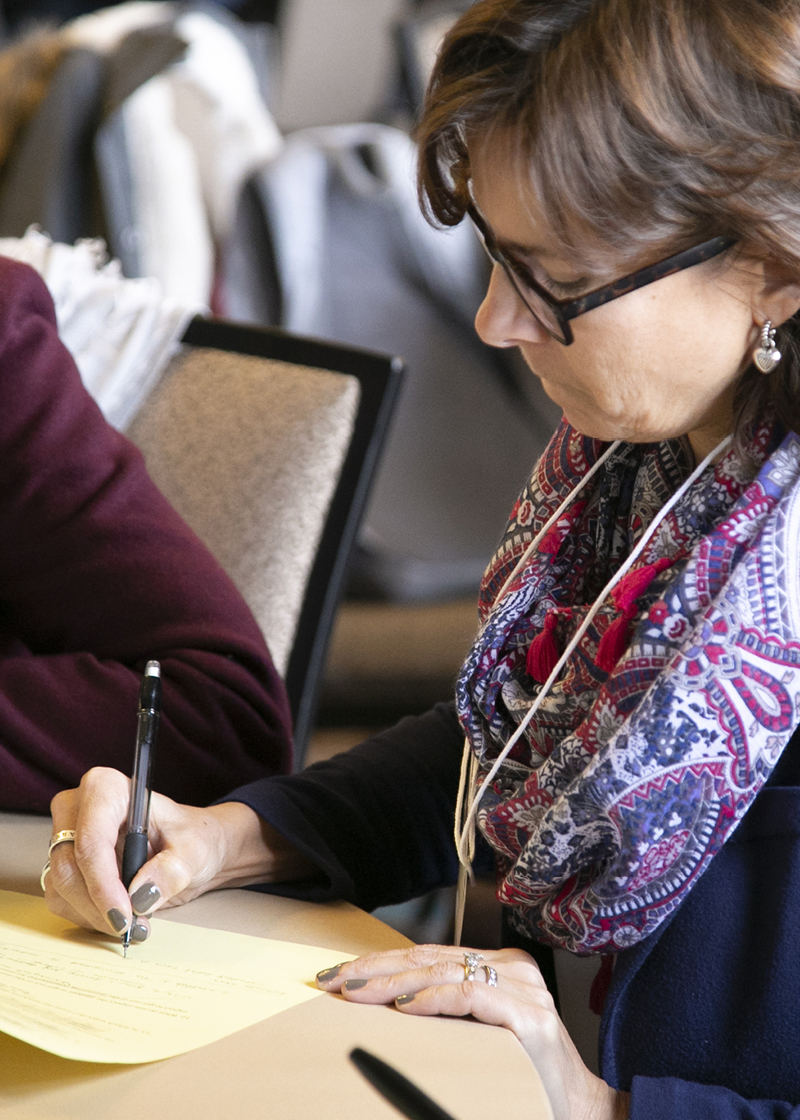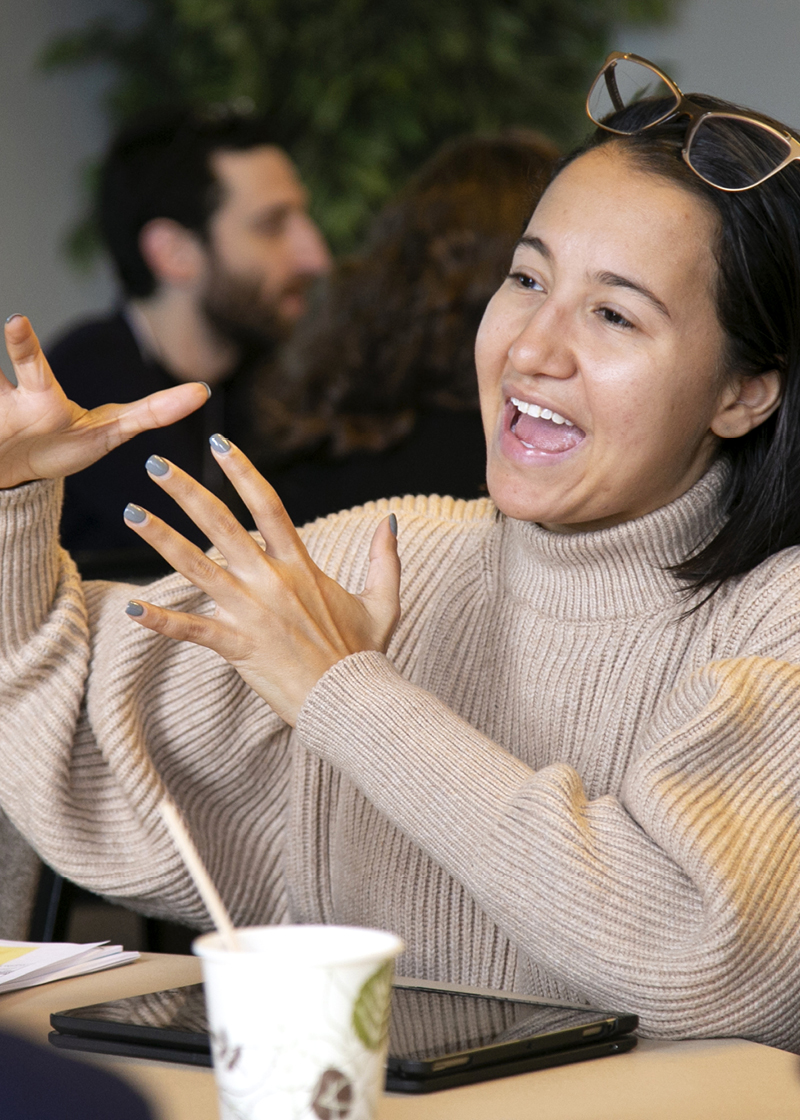Rackham’s Faculty Committee on Mentoring (MORE)

MORE (Mentoring Others Results in Excellence) is Rackham’s faculty committee on mentoring. MORE engages with faculty and graduate students to foster conversations about mentoring. Specifically, the committee provides faculty with effective tools and practices for mentoring graduate students in an effort to improve retention, productivity, and overall student success. MORE committee members are 12 faculty with appointments in different schools and colleges of the University of Michigan. For questions about the MORE Committee or MORE support, please contact us at [email protected].
Resources for U-M Graduate Programs
The MORE Committee is available to facilitate departmental mentoring workshops and offer program consultations upon request. The department’s graduate program leadership will identify the motivation for the workshop, challenges to be addressed, and the desired outcomes departments wish to see as a result of working closely with the MORE Committee. The workshops can be tailored to meet the needs of the program while offering faculty an opportunity to discuss norms for faculty-graduate mentoring within their field(s), and to discover the range of strategies that faculty use in mentoring graduate students. Increasingly, departments use the workshops or consultations as an opportunity to develop/implement and discuss the professional development of students, the diversity of the graduate student population, the importance of two-way conversations between mentor and mentee, and the value of written mentoring plans.

Resources for Faculty and Graduate Students
MORE provides faculty with evidence-based tools and practices for mentoring graduate students and seeks to improve the graduate school experience for all students.
Workshops
Mentoring Plan Templates
MORE’s mentoring plan templates are intended to facilitate two-way conversations between mentor and mentee.
Workshops
Getting Your Mentoring Relationship Off to a Good Start
This workshop helps enhance the mentoring relationship between the student and faculty mentor by guiding them in explicitly defining and documenting shared expectations. In the first half of the workshop, mentors and mentees work independently in separate workshop sessions to identify their objectives and work styles and to consider strategies for dealing with possible mentoring challenges. In the second half of the workshop, student-faculty pairs work together to develop a written mentoring plan as a means of codifying some of the most important elements (needs, goals, mutual expectations) of a two-way mentoring relationship. Over 90 percent of both faculty and student workshop participants find this workshop to be informative and helpful.
Mentoring Workshop for New Faculty
Working with graduate students can be one of the most satisfying aspects of being at a research university. In this workshop, new faculty are introduced to research on best practices in mentoring and to tools that can facilitate mentoring relationships. We invite new faculty to learn from experienced colleagues about effective mentoring, understand how a written mentoring plan can help create a two-way conversation between mentor and mentee, and exchange ideas about managing challenging mentoring situations.
Mentoring Across Difference 2.0
This workshop is intended to invite deeper reflection about the issues, concerns, and situations involved when mentoring students from non-traditional backgrounds. Faculty are invited to consider specific actions to take in research and learning spaces that address issues and concerns pertaining to mentoring across difference. The workshop encourages and supports faculty exploring approaches and solutions that work best for them and their students in particular research laboratories, research teams, and in the research projects students are pursuing under a mentor’s guidance.

Upcoming Workshops
Getting Your Mentoring Relationship Off to a Good Start
- Monday, February 10, 2025
- 9:30 a.m. to 12:00 p.m.
- Event Location: Virtual
- Faculty Registration
- Student Registration
Mentoring Across Difference 2.0 (Faculty Only)
- Thursday, March 20, 2025
- 11:00 a.m. to 12:30 p.m.
- Event Location: Central Campus, Rackham Building
- Faculty Registration
Mentoring 101 and Introduction to Rackham for New Graduate Faculty
- Tuesday, April 8, 2025
- 12:00 p.m. to 2:00 p.m
- Event Location: Central Campus, Rackham Building
- Faculty Registration
Mentoring Plan Templates
MORE’s mentoring plan templates are intended to facilitate two-way conversations between mentor and mentee. A mentoring plan is a written understanding between a mentor (or mentors) and mentee about academic and professional goals and expectations, as well as about their respective needs and responsibilities in the mentoring relation. The plan is the outcome of an interactive process and is meant to be a working document, revisited and updated annually, as mentees progress through their graduate studies. Several templates are available; tailoring questions and building your own template with the set of topics that best fits specific disciplinary needs is encouraged—and, indeed, expected.
Developing Shared Expectations
- STEM and Social Sciences Focus: Word, Google Docs Template
- Humanities Focus: Word, Google Docs Template
- Co-mentoring Triads: Word, Google Docs Template
Additional Mentoring Resources
The following links have been collected to help support the academic success of graduate students throughout the University of Michigan. Please email your link suggestions to us.
University Career Alumni Network (UCAN)
Through its University Career Alumni Network, the Alumni Association strives to connect current students and members of the Alumni Association with mentors who are able to provide career coaching on topics ranging from information about their occupation to relocating to a new city. Alumni mentors represent all job stages—from early career to experienced professionals.
Council of Graduate Schools Resources on Culturally Aware Mentoring
Explore a curated collection of books, articles, websites, videos, and podcasts addressing the value of different student experiences in mentoring relationships.
National Research Mentoring Network (NRMN)
NRMN’s mission is to provide researchers across all career stages in the biomedical, behavioral, clinical, and social sciences with the evidence-based mentorship and professional development programming that emphasizes the benefits and challenges of diversity, inclusivity and culture.

MORE Committee Members
Rackham Graduate School formed the MORE Committee in 2008 with support from the provost’s office to improve the graduate school experience for all students. Current members of the committee include:
Scott E. Barolo
Director, Program in Biomedical Sciences; Associate Professor of Cell and Developmental Biology (Medical School)
Nicole Ellison
Karl E. Weick Collegiate Professor of Information and Professor of Information (School of Information) and Professor of Communication and Media (College of Literature, Science, and the Arts)
Marina Epelman
Associate Chair, Department of Industrial and Operations Engineering and Professor of Industrial and Operations Engineering (College of Engineering)
Reginald Roland Jackson
Professor of Asian Languages and Cultures (College of Literature, Science, and the Arts)
Kristen Jensen
Dean’s Office Program Officer (Rackham Graduate School)
Zana Kwaiser
Program Officer for Dean’s Office (Rackham Graduate School)
Lisa Rose Lattuca
Director, Center for the Study of Higher and Postsecondary Education; Professor of Education (Marsal Family School of Education); and Professor of Integrative Systems and Design (College of Engineering)
Victor Mendoza
Associate Professor of Women’s and Gender Studies and Associate Professor of English Language and Literature (College of Literature, Science, and the Arts)
Manoj Puthenveedu
Professor of Pharmacology and Director of the Cellular and Molecular Biology Graduate Program (Medical School)
Melanie S. Sanford
Moses Gomberg Distinguished University Professor of Chemistry and Arthur F. Thurnau Professor of Chemistry (College of Literature, Science, and the Arts)
Teresa Satterfield
Professor of Romance Languages and Literatures and Professor of Linguistics (College of Literature, Science, and the Arts)
David Sept
Professor of Biomedical Engineering (College of Engineering and the Medical School) and Associate Dean for Academic Programs and Initiatives (Rackham Graduate School)
Alford A. Young, Jr.
MORE Committee Chair; University Diversity and Social Transformation Professor; Edgar G. Epps Collegiate Professor of Sociology and Arthur F. Thurnau Professor of Sociology, Professor of Afroamerican and African Studies (College of Literature, Science, and the Arts), and Professor of Public Policy (Ford School of Public Policy)
Michaela T. Zint
Associate Dean of Academic Affairs and Arthur F. Thurnau Professor of Environment and Sustainability (School for Environment and Sustainability), Professor of Environment (College of Literature, Science, and the Arts), and Professor of Education (School of Education)
